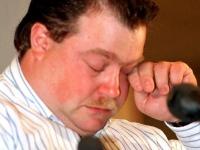BROOKE GLADSTONE: It’s perilous to rely on official sources. Like all sources, they have their own motives for imparting information. When that’s all the information a reporter has, the results can be tragic. Consider what happened on July 27th, 1996, during the Summer Olympics in Atlanta.
[CLIP]:
FEMALE CORRESPONDENT: Well, here in Atlanta, joy and celebration quickly turned to fear and death after an explosion in the Olympic Centennial Park early this morning. Authorities say it was a crude pipe bomb that exploded in the park…
[END CLIP]
BROOKE GLADSTONE: Richard Jewell, working as a private security guard, found the bomb, alerted the police and helped evacuate the area, likely saving some lives. He then became a suspect, ridiculed and humiliated by the media. When he was cleared, he sued a number of news outlets and collected a fair piece of change. But it was clear from his interview with 60 Minutes’ Mike Wallace that his nightmare had never really ended.
[CLIP]:
RICHARD JEWELL: I'm gonna tell you something, Mr. Wallace. There’s six, seven people in this room with us right now.
MIKE WALLACE: Yeah.
RICHARD JEWELL: And I don't care what they say now. That first week, everybody in this room thought I was the bomber.
[END CLIP]
BROOKE GLADSTONE: Jewell is the poster child for what happens when journalists fly into the ozone with law enforcement’s wind under their wings. But he has a lot of competition.
[CLIP]:
WEN HO LEE: I devote the best time of my life to this country, to make this country stronger. But suddenly they told me I'm a traitor.
[END CLIP]
BROOKE GLADSTONE: Taiwanese-American scientist Wen Ho Lee was working at the Los Alamos National Laboratory when he was accused of stealing nuclear secrets for China. He was fired in March of 1999. News outlets, led by The New York Times, published a slew of incriminating stories. Lee was arrested and held in solitary confinement for nine months. Eventually, 58 of the 59 charges against him were dropped. He sued news outlets and the government, and won. And then came the age of terror, more suspects, more suspicious leaks.
GLENN GREENWALD: What the government and the media jointly did to Steven Hatfill is a disgrace.
BROOKE GLADSTONE: For a while, Steven Hatfill, an expert in biowarfare, was the FBI’s suspect of choice for the 2001 anthrax attacks. Salon’s Glenn Greenwald told us in 2008, after biodefense researcher Bruce Ivins killed himself as he was about to be charged with the crime, that Hatfill’s earlier persecution by the press, orchestrated by a series of FBI leaks, was utterly unjustified.
GLENN GREENWALD: They did things like alert ABC News ahead of time when they searched his apartment wearing bioweapons suits. All along, there was zero evidence linking Steven Hatfill to the anthrax attacks. It was a lynch mob that was achieved through anonymous leaks, which journalists then uncritically reported until the country was convinced that he was the killer.
BROOKE GLADSTONE: Journalist Ronald Kessler has long covered the FBI.
RONALD KESSLER: The purpose of these leaks is to try to shake up the suspect and see what he'll do and see if more evidence can be obtained that way. It’s almost unheard of for FBI investigations to be leaked – well, you know, with some exceptions – and the fact that this is happening, I think, indicates that there is this motive involved.
JOHN MILLER: I find, having been on both sides of this fence, that there is no shared sense of responsibility here.
BROOKE GLADSTONE: John Miller is a former ABC news reporter. When we spoke to him in 2008, he was assistant director for Public Affairs at the FBI.
JOHN MILLER: There is intensive criticism, ironically, by the media, for so-called government leaks especially in cases where individuals later turn out to be perhaps not the right subject of the investigation. Yet, it is the same media that put pressure on people, try to pull information out of them, then publish it and then seem to be shocked and turn to blame the government.
BROOKE GLADSTONE: But the stakes can be higher than the destruction of a single man’s reputation. Bad information from officials can smear an entire city. Here’s New Orleans Mayor Ray Nagin in the midst of Hurricane Katrina in 2005.
[CLIP]:
MAYOR RAY NAGIN: They have people standing out there, have been in that frickin’ Superdome for five days watchin’ dead bodies, watchin’ hooligans killing people, raping people.
[END CLIP]
BROOKE GLADSTONE: The stakes can even be higher than that. Yellowcake uranium from Niger, aluminum tubes for centrifuges, hidden biological weapons labs in the Iraqi desert, all sanctioned leaks or official statements, all policy-driven, all wrong, formed the pretext for going to war. And it has been forever thus.
CLIP:
PRESIDENT LYNDON JOHNSON: My fellow Americans, as President and Commander-in-Chief, it is my duty to the American people to report that renewed hostile actions against United States ships on the high seas in the Gulf of Tonkin have today required me to order the military forces of the United States to take action in reply.
[END CLIP]
BROOKE GLADSTONE: The Gulf of Tonkin - epically bad official information. It’s exactly like bad food, sometimes deliberately poisoned, sometimes spoiled by accident or happenstance. And it should be treated like food, with some knowledge of its provenance and nutritional value, consumed only after judicious prodding and a good long sniff, because you need it to live but the bad stuff can kill you.
[MUSIC/MUSIC UP AND UNDER]
